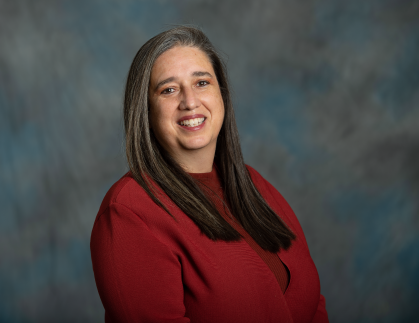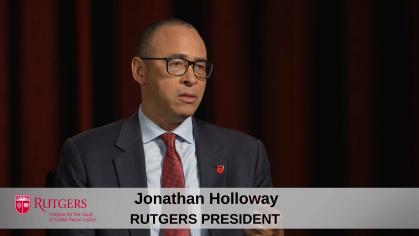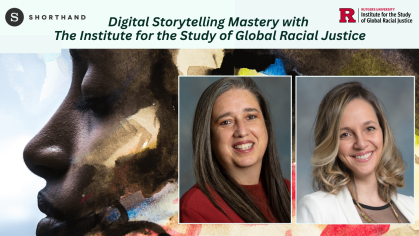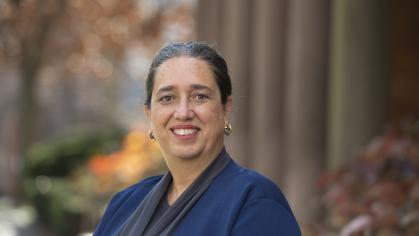Michelle Stephens Among Top Rutgers Black History Month Researchers and Leaders
To celebrate Black History Month, the Office for Research is highlighting some of the many researchers from across Rutgers, The State University of New Jersey. The vital work being conducted represents the diversity of research within Rutgers, which is inclusive of STEM, arts, humanities and the social sciences.
Michelle Stephens, Ph.D., ISGRJ Founding and Executive Director is highlighted as one of the researchers from across the university who are making an impact on the university and their field of study. She is recognized as not just a leader in her field, but also the embodiment of the notions of diversity, equity, and inclusion that the university and the Office for Research strive to uphold.

Michelle Stephens, PhD
Executive Director, Institute for the Study of Global Racial Justice
Professor, English
Professor, Latino and Caribbean Studies
School of Arts and Sciences
Rutgers-New Brunswick
OfR: What is the focus of your research and its potential impact?
Stephens: The focus of my research, in the broadest of terms, is the literature and culture of the African diaspora. More specifically, I explore the specific contributions of Caribbean intellectuals--artists, writers and thinkers—to the ways we think about race in the Americas, both specifically in the United States and in the Caribbean islands and territories. More recently I have turned to thinking and writing about how much meaning we have given to difference, racial difference and sexual difference, in the ways we think about what it means to be human. In addition to being a literary and cultural studies scholar I have also trained as a psychoanalyst, so most recently I have been publishing in the research sub-field of "race and psychoanalysis." My writing explores how racial thinking structures our minds and emotions. I have been able to see the impact of my prior training in helping psychoanalytic theorists, and clinicians, revise their model of the mind to include multiplicity and intersectionality as core aspects of a more plural notion of human subjectivity.
OfR: What inspired you to focus on this particular area of research, and what inspires you now?
Stephens: When I moved from Jamaica to the United States to attend college, myself, my mother and my sister, all went through identity shifts in how we understood ourselves racially. We ended up in very different places, even though we shared very similar complexions. That was fascinating to me—what is race in America if three family members with similar complexions find themselves in different kinds of communities in the US and start defining themselves differently? Understanding how race, the ways each and every one of us thinks about ourselves racially—even those who are not thinking about themselves racially—became a fascinating topic for me from then on. And seeing how writers, visual artists, musicians, and other creatives are inspired by such questions as, what exactly is blackness? whiteness? even when those questions have led to traumatizing experiences--I have been so inspired in studying and trying to understand the meanings behind their works and how they answer those questions for themselves.
OfR: What has your experience been like as a person of color working in your field of research?
Stephens: As a Caribbeanist and Black Studies scholar I have found a lot of community in this work, a way to think about questions that have defined me with like-minded people who may come up with similar or different kinds of answers. As a psychoanalyst I was surprised, and at first intimidated, in realizing that much of the psychoanalytic and mental health field had NOT thought about the way racial differentiation impacts how we treat people, interpersonally and clinically. Once past that shock, I am finding that I have something to say, and it is very rewarding to feel like I am being listened to and can have an impact helping others think about things they have not thought about before. It has broadened my perspective and made me more confident about my scholarly insights regarding racial formation in the Americas, which I am now bringing back to my African Diaspora studies research.
OfR: What would your advice be to any student who wishes to pursue a career in your field of research?
Stephens: To not be afraid to invest in the life of the mind, to devote one's studies to understanding oneself and the world we live in, the history of how we have gotten to this moment, and the meaning we are making of our present. These are very challenging times for us all. If it is a passion, and undertaken seriously, I have found it rewarding to devote one's life to the scholarly study of the historical moment one lives in. Study in the arts and humanities can lead to profitable careers. I would encourage them to have faith in that.
OfR: What more could be done to improve the diversity and inclusion within your field of research?
Stephens: We need to be thinking about the full pipeline—what messages are students receiving about studying in the arts and humanities more broadly, about studying race specifically, from their middle-school teachers? from their high school guidance counselors? For those students who still find themselves pursuing Black Studies in various humanities and social science fields in college, what prep programs exist to give them a sense of what getting a PhD in that field will look like for them? Who is mentoring them who can share a similar experience? That last question is a key one for us, here in the college environment. I really credit my colleagues in the University Committee on Diversity and Inclusion and in the Office of Equity ad Inclusion, Deepa Kumar and Anna Branch in particular, for foregrounding graduate and faculty mentorship as the crucial component for developing a diverse and inclusively excellent research community.


